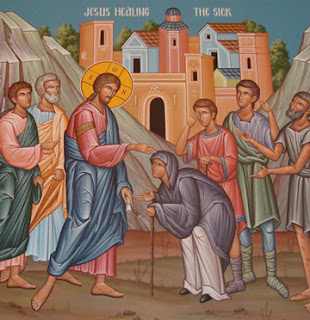February Trinity
(5th Sunday before Easter)
Matthew 17: 1-9
 |
| Fra Angelico |
After six days, Jesus took with him Peter, James,
and John, the brother of James, and led them together up a high mountain apart
from the others.
There, his appearance was transformed before them.
His face shone as bright as the sun, and his garments became white, shining
bright as the light. And behold, there appeared before them Moses and Elijah,
conversing in the spirit with Jesus.
And
Peter said to Jesus, “Lord, it is good for us to be in this place. If you wish,
I will build here three shelters, one for you, one for Moses and one for
Elijah.”
While he was still speaking, a bright cloud
overshadowed them, and suddenly, they heard a voice from the cloud that said,
“This is my son, whom I love. In him, I am revealed. Hear him.”
When the disciples heard this, they fell on their
faces to the ground in awe and terror. And Jesus approached them, and touching
them said, “Rise, and do not fear.” And raising their eyes, they saw no one
except Jesus.
As they were coming down the mountain, Jesus
instructed them: “Tell no one what you have seen until the Son of Man has risen
from the dead.”
5th February
Trinity
March 8, 2020
Matthew 17: 1-13
This gospel reading shows us
the moment when the spirit of Christ, the glorious radiance of God’s love, penetrates
the life and soul of Jesus. He shines like the sun. He has reached the transparent
stage of enlightenment.
Had he been a Buddha, this
moment of fulfilled enlightenment would have meant that he no longer had any
need to remain in the body. He could have ascended to heaven. Instead, Christ
chooses the path of descent. He steps back onto the earth. He touches his
disciples. He comes down from the mountain with them and consciously walks his
way toward his coming torture, his sacrificial death, his descent into the
underworld. He does so with confidence and trust. For the setting of his sun
would be followed by another greater sunrise.
Christ Jesus is the archetype
of our being fully human. We can pattern our responses after him. After every
high point, we can consciously bring ourselves back to earth. We can accept our
sufferings with willingness. We can face our own demise with confidence. For as
the poet Tagore said,
Death is not the
extinguishing of the light, but the putting out of the lamp, because Dawn has
come.
























